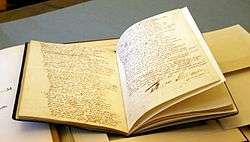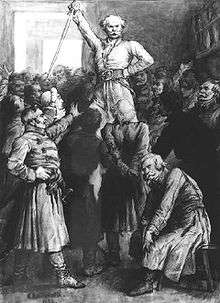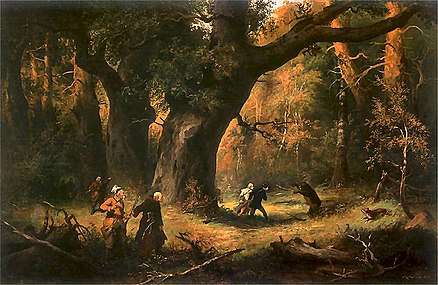Pan Tadeusz
Pan Tadeusz (full title: Master Thaddeus, or the Last Foray in Lithuania: A Nobility's Tale of the Years 1811–1812, in Twelve Books of Verse[lower-alpha 1][lower-alpha 2]) is an epic poem by the Polish poet, writer, translator and philosopher Adam Mickiewicz. The book, written in Polish alexandrines,[1] was first published on 28 June 1834 in Paris. It is deemed the last great epic poem in European literature.[2][3]
 Title page of the first edition | |
| Author | Adam Mickiewicz |
|---|---|
| Country | France |
| Language | Polish |
| Genre | Epic poem |
| Publisher | Aleksander Jełowicki |
Publication date | 28 June 1834 |
Pan Tadeusz, Poland's national epic, is compulsory reading in Polish schools and has been translated into 33 languages.[4] A film version, directed by Andrzej Wajda, was released in 1999. In 2014 Pan Tadeusz was incorporated into Poland's list in the UNESCO Memory of the World Programme.[5]
Content

The story takes place over the course of five days in 1811 and two days in 1812, at a time in history when Poland-Lithuania had been divided between the armies of Russia, Prussia, and Austria (see Partitions of Poland) and erased from the political map of Europe, although in 1807 Napoleon had established a satellite Duchy of Warsaw in the Prussian partition which remained in existence until the Congress of Vienna held after Napoleon's defeat.[6]
The place is situated within the Russian partition, in the village of Soplicowo, the country estate of the Soplica clan. Pan Tadeusz recounts the story of two feuding noble families, and the love between Tadeusz Soplica (the title character) of one family, and Zosia of the other. A subplot involves a spontaneous revolt of the local inhabitants against the occupying Russian garrison. Mickiewicz, an exile in Paris and thus beyond the reach of Russian censorship, wrote openly about the occupation.[7]
The Polish national poem begins with the words "O Lithuania"; this largely stems from the fact that the 19th-century concept of nationality had not yet been geopoliticized. The term "Lithuania" used by Mickiewicz refers to a geographical region encompassed by the present-day borders of Belarus and Lithuania as well as the eastern edge of present-day Poland.
Compendium ferculorum, albo Zebranie potraw, the oldest cookbook in Polish, served as an inspiration for Mickiewicz's nostalgic description of "the last Old Polish feast" in Pan Tadeusz.[8] In his account of the fictional banquet in Book 12, the poet included the names of several dishes described in Compendium ferculorum, such as "royal borscht", as well as two of the master chef's secrets: the broth with pearls and a coin, and the three-way fish.[9]
Fame
All of Mickiewicz's works, including Pan Tadeusz, are written in the Polish language. He had been brought up in the multicultural Polish-Lithuanian Commonwealth, a state that incorporated most of what today are the separate countries of Poland, Lithuania, Belarus, and Ukraine. (Hence a waggish witticism has it that Mickiewicz, who grew up in a Polish family in Belarus and studied at Vilnius University in Lithuania, was "a Belarusian poet who wrote about Lithuania in Polish".) Of numerous passages from Pan Tadeusz that are familiar to Poles, the most celebrated is its opening quatrain:
Litwo! Ojczyzno moja! ty jesteś jak zdrowie;
Ile cię trzeba cenić, ten tylko się dowie,
Kto cię stracił. Dziś piękność twą w całej ozdobie
Widzę i opisuję, bo tęsknię po tobie.
O Lithuania, my homeland! thou art like health;
Only he can truly appreciate thy worth
Who has lost thee. Now I see and sing thy beauty
In all of its glory, because I long for thee.
- (translation by Christopher Kasparek)
Lithuania, my fatherland! You are like health;
How much you must be valued, will only discover
The one who has lost you.
- (translation by Katie Busch-Sorensen)
O Lithuania, my country, thou
Art like good health; I never knew till now
How precious, till I lost thee.
- (translation by Kenneth R. Mackenzie)
Lithuania, my country! You are as good health:
How much one should prize you, he only can tell
Who has lost you.
- (translation by Marcel Weyland)
Oh Lithuania, my homeland,
you are like health--so valued when lost
beyond recovery; let these words now stand
restoring you, redeeming exile's cost.
- (translation by Leonard Kress)
Thee, Lithuania, I sing, my native land.
Thou art like health, for he can only understand
Thy merit and thy worth who lost thee long ago.
My pen now limns thy beauty, for I miss thee so.
- (translation by Jarek Zawadzki)
Lithuania! My homeland! You are health alone.
Your worth can only ever be known by one
Who's lost you. Today I see and tell anew
Your lovely beauty, as I long for you.
- (translation by Bill Johnston)
Other translations
Maude Ashurst Biggs published "Master Thaddeus" in 1885 in London, Watson Kirkconnell "Sir Thaddeus" in 1962. George Rapall Noyes published a prose translation of the poem in 1917. Book Four was published in 2000 by Christopher Adam Zakrzewski. A full version translation by Marcel Weyland in the original metre was published in Sydney in 2004, London and New York in 2005 (ISBN 1567002196 US, and ISBN 1873106777 UK). A new English verse translation by Bill Johnston was published in September 2018 (ISBN 9781939810007).[10] In 2019, Johnston received the National Translation Award bestowed by the American Literary Translators Association for his translation of Mickiewicz's work.[11]
The first translation of the poem into a different language, Belarusian, was made in 1859 by the Belarusian writer and dramatist Vintsent Dunin-Martsinkyevich, in Vilnius.[12] Because of the pressure from Tsarist authorities, Dunin-Martshinkyevich was able to publish only the first two chapters of the poem.
Film adaptations
The first film version of the poem as a feature was produced in 1928. The film version made by Andrzej Wajda in 1999 was his great cinematic success in Poland.
Popular recognition
In 2012, during the first edition the National Reading Day organized by the President of Poland Bronisław Komorowski, Pan Tadeusz was read in numerous locations across the country as a way of promoting readership and popularizing Polish literature.[13][14] Google's Doodle for Poland, Lithuania, Belarus, Iceland, Ireland and UK on 28 June 2019 commemorated the poem.[15][16]
Gallery
 Illustration to Book III of Pan Tadeusz by Adam Mickiewicz. Picking Mushrooms, painting by Franciszek Kostrzewski, ca. 1860.
Illustration to Book III of Pan Tadeusz by Adam Mickiewicz. Picking Mushrooms, painting by Franciszek Kostrzewski, ca. 1860. Illustration to Book VII of Pan Tadeusz. Gerwazy showing off his sword called Scyzoryk (Pocketknife), by Michał Andriolli
Illustration to Book VII of Pan Tadeusz. Gerwazy showing off his sword called Scyzoryk (Pocketknife), by Michał Andriolli The Hunt, illustration to Book IV
The Hunt, illustration to Book IV Jankiel's Concert, oil on canvas by Maurycy Trębacz (1861-1941)
Jankiel's Concert, oil on canvas by Maurycy Trębacz (1861-1941)
See also
- Polish literature
- List of Polish language poets
Notes
- Polish original: Pan Tadeusz, czyli ostatni zajazd na Litwie. Historia szlachecka z roku 1811 i 1812 we dwunastu księgach wierszem
- A foray, in this context, was a method of enforcing land rights among the Polish privileged nobility.
References
- "The Historical House: Pan Tadeusz". Retrieved 2019-09-15.
- Czesław Miłosz, The history of Polish literature. IV. Romanticism, p. 228. Google Books. University of California Press, 1983. ISBN 0-520-04477-0. Retrieved October 7, 2011.
- "Pan Tadeusz Poem: Five things you need to know about this epic Polish masterpiece". Retrieved 2019-09-15.
- "Pan Tadeusz w Google Doodle. Pierwsza publikacja książki obchodzi 185 urodziny". Retrieved 2019-09-15.
- ""Pan Tadeusz" na Polskiej Liście UNESCO". Retrieved 2019-09-15.
- "A Lithuanian Romeo and Juliet: Pan Tadeusz, by Adam Mickiewicz, reviewed". Retrieved 2019-09-15.
- "Pan Tadeusz - Adam Mickiewicz". Retrieved 2019-09-15.
- Bąbel, Agnieszka M. (2000a). "Garnek i księga – związki tekstu kulinarnego z tekstem literackim w literaturze polskiej XIX wieku" [The pot and the book: relationships between culinary and literary texts in Polish literature of the 19th century] (PDF). Teksty Drugie: Teoria literatury, krytyka, interpretacja (in Polish). Warszawa: Instytut Badań Literackich Polskiej Akademii Nauk. 6: 163–181. ISSN 0867-0633. Retrieved 2017-01-04.
- Ocieczek, Renarda (2000). "'Zabytek drogi prawych zwyczajów' – o książce kucharskiej, którą czytywał Mickiewicz" ["The Precious Monument of Righteous Customs" – on the cookery book that Mickiewicz used to read]. In Piechota, Marek (ed.). "Pieśni ogromnych dwanaście...": Studia i szkice o Panu Tadeuszu ["Twelve great cantos...": Studies and essays on Pan Tadeusz] (PDF) (in Polish). Katowice: Wydawnictwo Uniwersytetu Śląskiego. pp. 171–191. ISBN 83-226-0598-2. ISSN 0208-6336. Retrieved 2017-01-03.CS1 maint: ignored ISBN errors (link)
- "New translation of Pan Tadeusz". Retrieved 2019-09-15.
- "Top US award given for translation of Polish epic poem". Retrieved 15 November 2019.
- (in Russian) Лапидус Н. И., Малюкович С. Д. Литература XIX века. М.: Университетское, 1992. P.147
- "Presidential couple launch National Reading event". Retrieved 2019-09-15.
- "National Reading Day". Retrieved 2019-09-15.
- Whitfield, Kate (28 June 2019). "Pan Tadeusz Poem: Why is Google paying tribute to the epic Polish masterpiece today?". Daily Express. Retrieved 28 June 2019.
- "185th Anniversary of the Publication of Pan Tadeusz Poem". Google. 28 June 2019. Retrieved 28 June 2019.
External links
| Wikiquote has quotations related to: Food and drink in Pan Tadeusz |
- Pan Tadeusz or The Last Foray in Lithuania: A Story of Life Among Polish Gentlefolk in the Years 1811 and 1812 in Twelve Books, the full text of the 1917 translation by George Rapall Noyes, 1917; the text also available from archive.org
- Pan Tadeusz or the Last Foray in Lithuania: a History of the Nobility in the Years 1811 and 1812 in Twelve Books of Verse translated by Leonard Kress
- Pan Tadeusz or The Last Foray in Lithuania: A Tale of the Gentry During 1811–1812 translated by Marcel Weyland, 2004
- Adam Mickiewicz. Sinjoro Tadeo, aŭ la lasta armita posedopreno en Litvo. Nobelara historio de la jaroj 1811 kaj 1812 en dekdu libroj verse esperanta.. Pan Tadeusz in Esperanto, translated by Antoni Grabowski